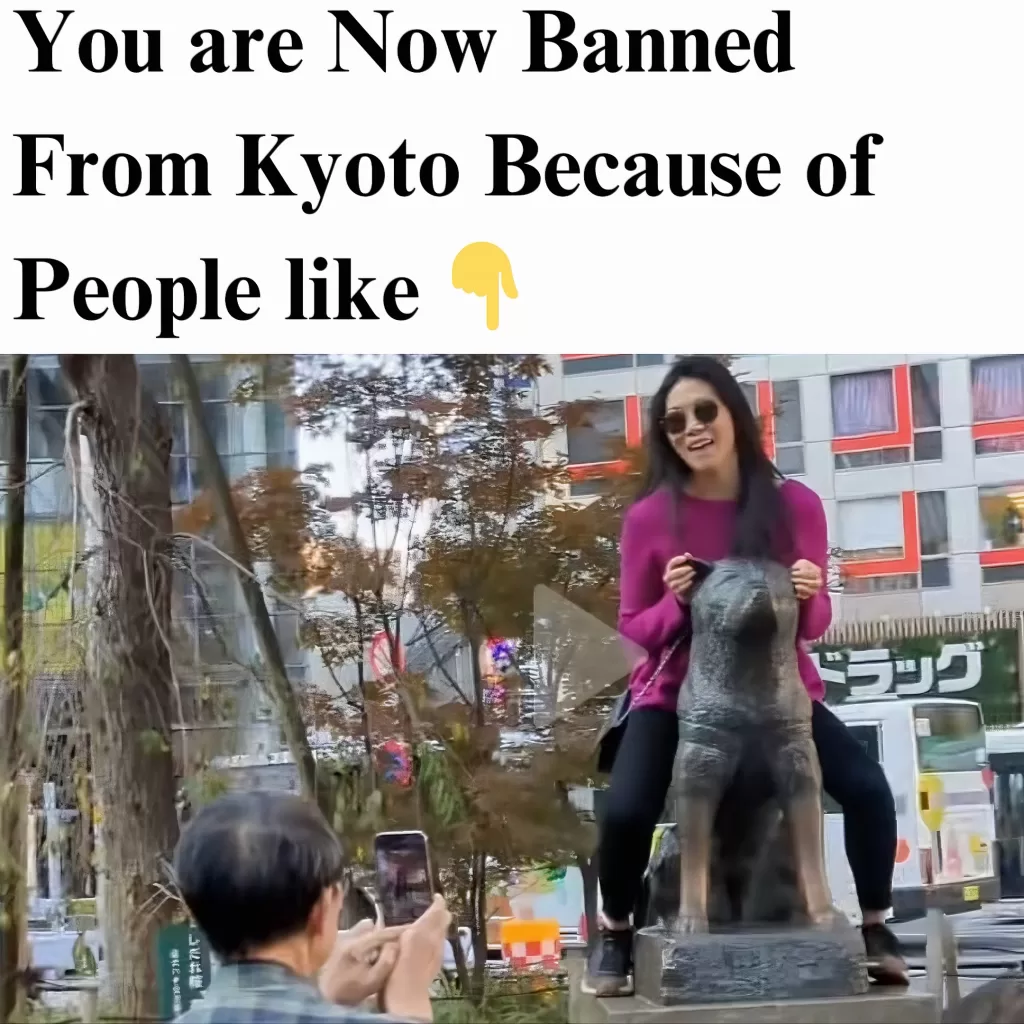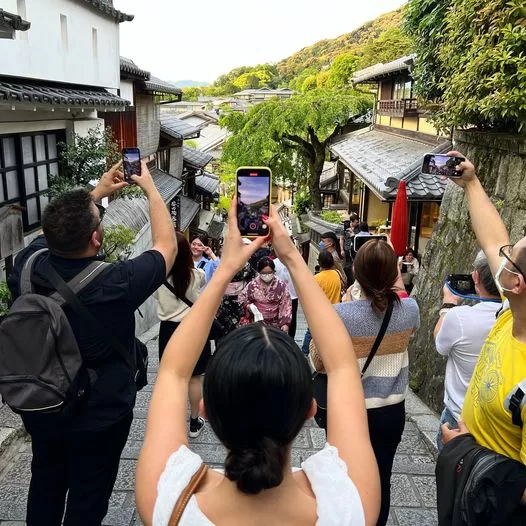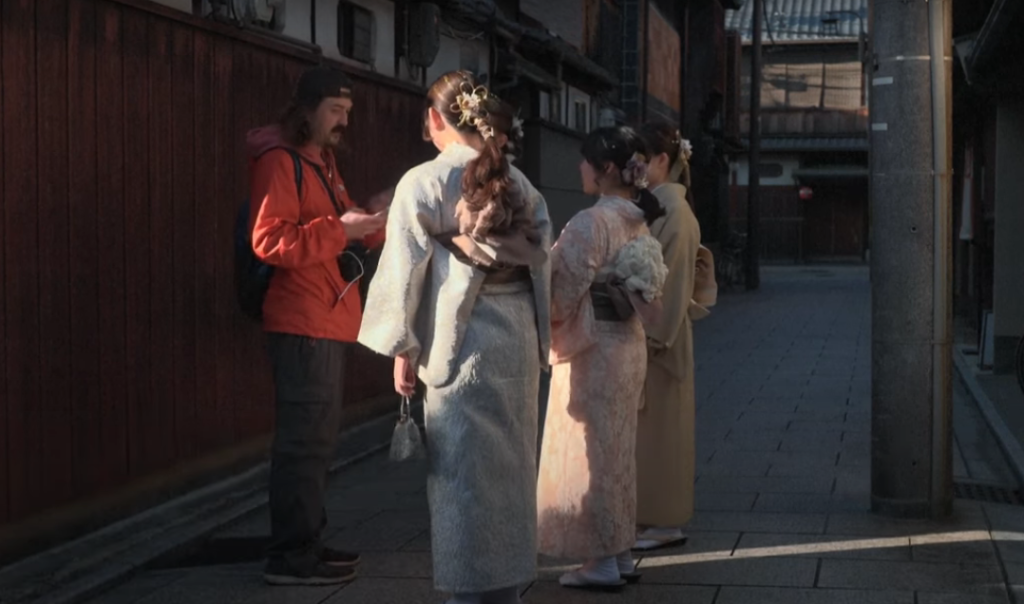Kyoto Bans Tourists From Parts of Geisha District Amid Bad Behavior Reports
Visitors to Kyoto’s famous Gion geisha district will soon face new restrictions as authorities aim to crack down on a rise in unruly tourist conduct. Starting April 2024, tourists will be banned from entering the picturesque private alleyways of Gion, one of Japan’s most popular sightseeing areas.

Gion District Tourist Ban Details
The Gion district council, comprising residents of the famous geisha district in Kyoto, Japan, has decided to ban tourists from entering certain private alleys in the area starting in April 2024.
This stems from repeated complaints by residents about misbehaving tourists, such as surrounding geishas’ taxis, damaging restaurant lanterns, and taking inappropriate photos.
While the main Hanamikoji Street will remain open to tourists, they will be prohibited from the specified private side streets where many of the traditional teahouses housing geisha are located.
The ban will likely be enforced by restricting entry to the private alleyways, though specific enforcement methods were not detailed.
It’s unclear exactly which alleys will be off-limits, but they house many of the ochaya (teahouses) where the approximately 100 geisha and apprentice maiko geisha entertain guests in Gion.
Residents Demand Action
The ban comes after residents of the ancient capital urged the city government to take action against overtourism and incidents of harassment targeting Kyoto’s geiko and maiko traditional entertainers.
In December, a council of Gion locals complained that their neighborhood was being treated “not like a theme park” by some visitors.

“We don’t want to do this, but we’re desperate,” said Isokazu Ota, a member of the residents’ council. Signs will be installed to remind tourists of the new restrictions on entering the narrow private streets, some just two meters wide.
Previous Attempts Failed
Previous efforts to encourage respectful behavior in Gion have proven ineffective. Signs asking tourists not to approach the geisha and fines up to ¥10,000 for non-consensual photography failed to deter determined visitors from getting close-up photos and videos.

Some tourists have been accused of ignoring personal space, touching the entertainers’ expensive kimonos, and trespassing on private property in pursuit of the perfect snapshot.

This portrayal of geisha as curiosities rather than highly skilled artists and conversationalists only furthers the misconception that they are adult entertainment workers.
Reddit User Reactions
The decision to ban tourists from private alleys in Kyoto’s historic Gion district sparked strong reactions from reddit users, with comments ranging from understanding and accepting the move as necessary due to disrespectful behavior, to disappointment at missing out on the cultural experience, and criticism of inconsiderate tourists lacking respect for local norms:
“I’m just glad I got to experience it. So lovely to see the geisha in their element on the way to dinners and performing. Sucks that ignorant tourists ruin it for us all.” – u/Haute510
This user feels fortunate to have visited Gion before the ban, lamenting that disrespectful tourists have spoiled the experience for others.
“Good tourists also hate the bad ones” – u/CuddlyChinchilla
A simple but poignant comment highlighting how inconsiderate tourists reflect poorly on all tourists.
“They have absolutely 0 respect for anybody but themselves.” – u/LeekTerrible
A harsh critique of the selfishness and disrespect exhibited by certain tourists.
“I find it disheartening that anyone going to visit Kyoto would not have at least a rudimentary understanding of Japanese culture, social norms and interpersonal rules…It’s not hard to be a good tourist.” – u/inthemoment_2121
This user expresses disappointment that tourists visiting a culturally significant place like Kyoto would not educate themselves on local customs and norms beforehand. They argue being a respectful tourist is achievable.
“I had the privilege to visit Kyoto last year. Just during one afternoon, I saw multiple tourists (all from the same group) following a geisha around, calling out to her, taking paparazzi-style pictures, and generally being obnoxious.” – u/Gardening_Socialist
This user shares a first-hand account of witnessing disrespectful tourist behavior towards a geisha in Kyoto, providing an example of the type of incident that likely motivated the ban.
“Was just there a few days ago. Chinese tourists were on another level. Not South or North Americans. Not Europeans. Chinese tourists were by far the most disrespectful people I had the displeasure of encountering on my trip.” – u/PmPuppyPicsPlz
This comment bluntly calls out Chinese tourists specifically as being extraordinarily disrespectful compared to other nationalities the user encountered recently in Kyoto. It stokes controversy by singling out one nationality.
Overcrowding Issues Elsewhere
Gion is not the only Japanese tourist hotspot struggling with overtourism in the post-pandemic travel revival. Officials in Yamanashi prefecture announced plans to charge a ¥2,000 climbing fee for Mount Fuji and cap daily visitor numbers during the summer hiking season to address littering and safety concerns over rapid “bullet ascents.”
After lifting Covid-19 travel restrictions last April, Japan saw foreign visitor numbers soar 79.5% in January 2024 compared to a year earlier, reaching pre-pandemic levels from January 2019.
Balancing Cultural Preservation
While the economic boost from tourism is welcome, the rise in visitor numbers has forced a reckoning over how to balance travel demands with preserving cultural heritage and resident quality of life.
Gion’s ban, though unfortunate, underscores the need to manage overcrowding before it permanently alters the atmosphere at iconic attractions.
Striking this balance will be crucial for Japan and global destinations alike as travel continues rebounding. Popular sites risk becoming mere “theme parks” devoid of authentic tradition if overwhelmed by masses of tourists disconnected from local context. Allowing overtourism to degrade cultural experiences is a loss for visitor and resident alike.